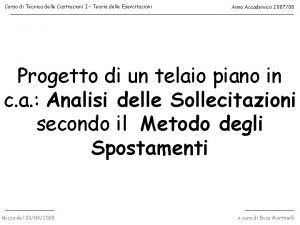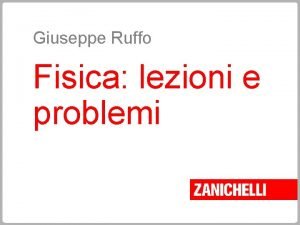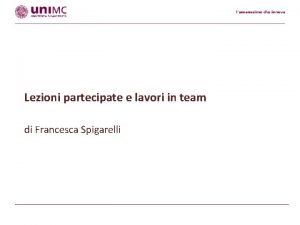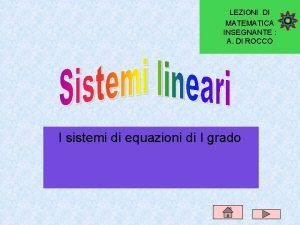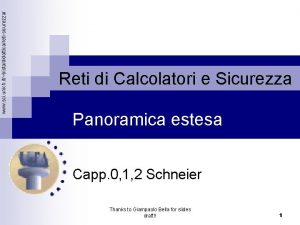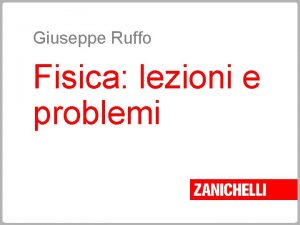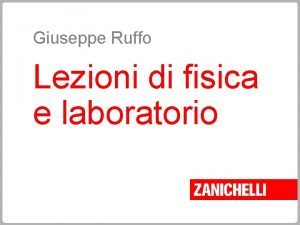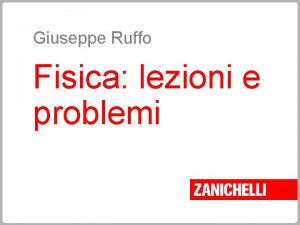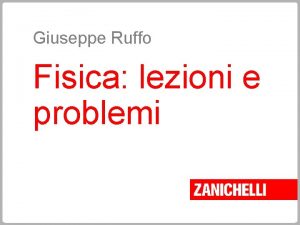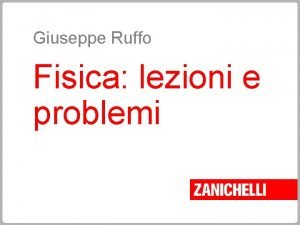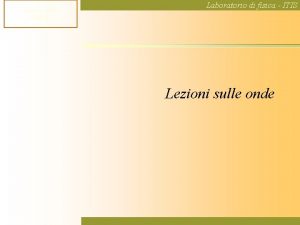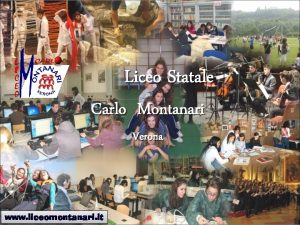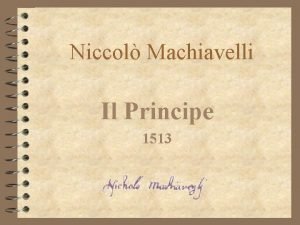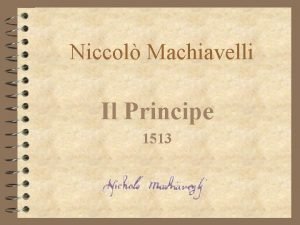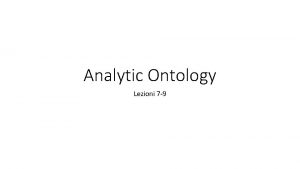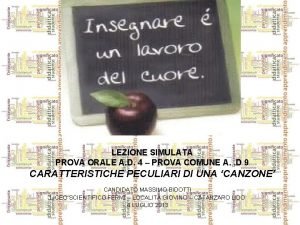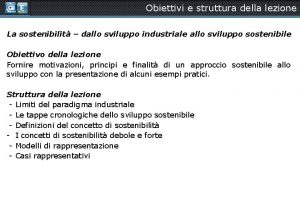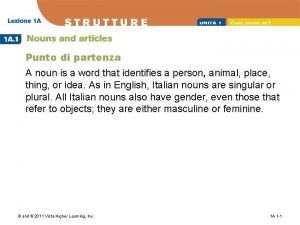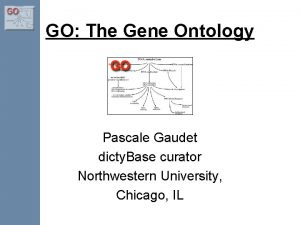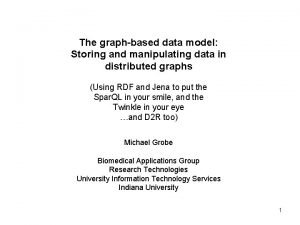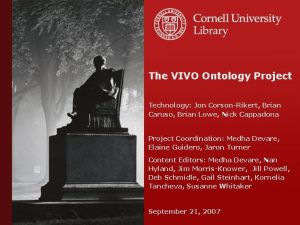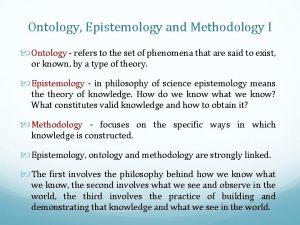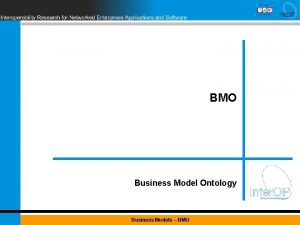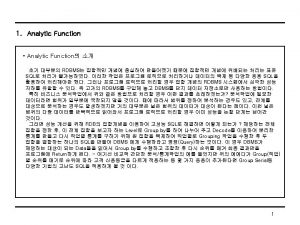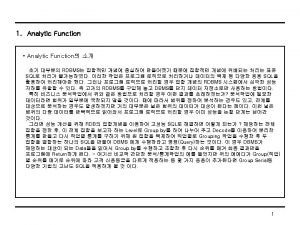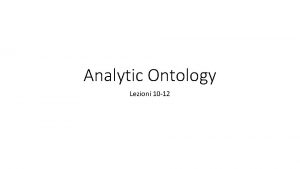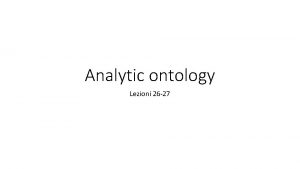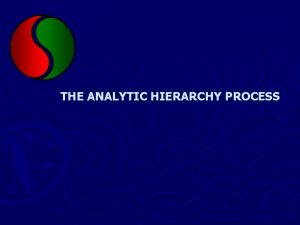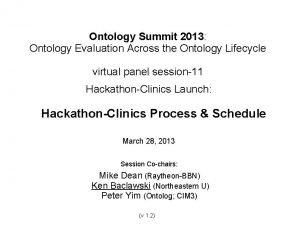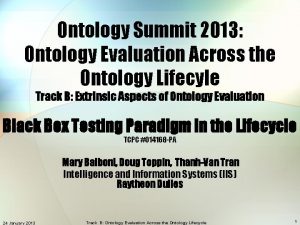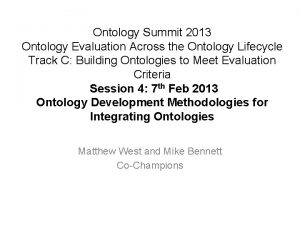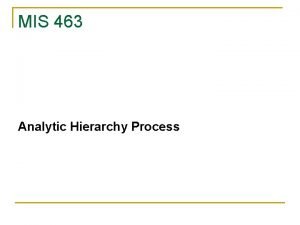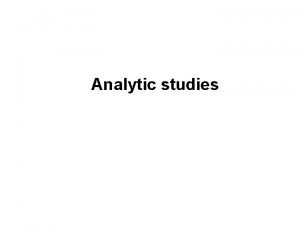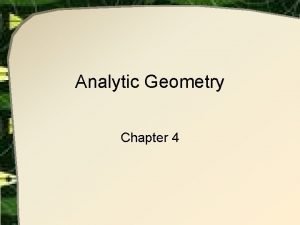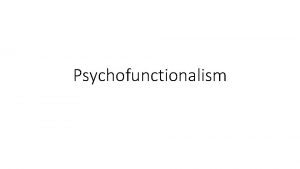Analytic Ontology 18 19 Lezioni 22 24 Lezione


































- Slides: 34

Analytic Ontology 18 -19 Lezioni 22 -24

• Lezione 22 • 19/11/18

• Vittorio Morato, "Contingent necessity-makers" • Lunedì ore 8. 30 • AULA B • 0, 25 cfu

Decidere ordine relazioni in lezioni 28 -30 • Proposta: • Nonexistent/fictional objects (Marco Governatori) • Maurin su Bradley regress (Alessia Bonifazi) • Scientism (Ladyman &Ross) (oppure common sense) (Laura Corona) • Futuri contingenti (Michele Bisceglia) • truthmaking (Linda Cecconi) • Chisholm su Teseo (Alessandro Pianese) • Sider su Teseo (Francesca De Simone) • (Argomento da decidere: Linda Andreozzi)

Presentism Now 5/5/14 - Seminario sul tempo per Liceo Classico di Jesi 5

The definition of presentism • (Necessarily, always) only what is present exists • There are (exist) only present entities • Whatever exists is present • For every x, if x esists, then x is present • Everything is present • For every x, x is present

The advantages of presentism • Ontological parsimony • Coherence with commmon sense • A-theory of time, thus with objective difference between past, present and future rejected by B-theories, but dear to common sense. • In contrast with other A-theories: the past is no longer, the future is not yet; absolute becoming • The past is no longer: simplest explanation of 'Thank goodness, that's over!' (Prior 1959; many replies) • 3 -dimensionalism (Endurantism) and qualitative change: the apple was unripe and it (the same apple) is (now) ripe. In particular, we are 3 - dimensional (No paradox such as that of Borges meeting his future self; «L’altro» , in Il libro di sabbia) • Open future • I know I am in the present, but how can I know it if presentism is false? (Bourne (2006, p. 23; see Cameron, The moving spotlight, p. 23, for a reply) • Orilia's evil argument

The evil argument for the moral desirability of presentism Università Statale di Milano - 2 Dicembre 2016 8

the pro-presentist annihilation argument • (P 1) Absence of sorrow is existentially preferable to occurrence of sorrow. • (P 2) If there were past sorrowful events, then: (i) they are part of reality, if the world is eternalist; (ii) they are not, if the world is presentist. • (P 3) There were sorrowful events. • Hence, • (PC) a presentist world is existentially preferable to an eternalist world. Università Statale di Milano - 2 Dicembre 2016 9

the pro-eternalist preservation argument • (E 1) Occurrence of joy is existentially preferable to absence of joy. • (E 2) If there were past joyful events, then: (i) they are part of reality, if the world is eternalist; (ii) they are not, if the world is presentist. • (E 3) There were joyful events. • Hence, • (EC) An eternalist world is existentially preferable to a presentist world. Università Statale di Milano - 2 Dicembre 2016 10

• Are these arguments equally powerful? • Or can we choose?

The powerful demon analogy • Imagine that a powerful and eccentric demon will flip a coin with this intention: • if the outcome is cross, he will bring about that a number of people will enjoy an extraordinarily pleasant experience and that someone will suffer excruciating pain; • if the outcome is head, he will do nothing. • Do you hope for cross or head? Università Statale di Milano - 2 Dicembre 2016 12

• Perhaps a utilitarian could insist that, if the quantity of pleasure brought about by the pleasant experiences is sufficiently high, the world is better off with them, despite the simultaneous existence of the pain. • But this seems cruel and thus presumably most of us would hope that the outcome is head: it is preferable not to have an unfortunate fellow in excruciating pain, even though nobody will enjoy the extraordinarily pleasant experience. • Analogously, . . .

A presentist world is better than an eternalist world • we should seemingly prefer a world in which all past sorrowful events are no part of reality, even if this means that all past joyful events are similarly erased. • See Orilia 2016: • https: //periodicos. sbu. unicamp. br/ojs/index. php/manuscrito/article/ view/8647885/14669

• Lezione 23 • 20/11/19

ordine relazioni in lezioni 28 -30 • • • Lezione 28 Nonexistent/fictional objects (Marco Governatori) Maurin su Bradley regress (Alessia Bonifazi) truthmaking (Linda Cecconi) Lezione 29 Scientism (Ladyman &Ross) (oppure common sense) (Laura Corona) Futuri contingenti (Michele Bisceglia) Dorato (vs. Orilia) su fisica e presentismo (Linda Andreozzi) Lezione 30 Chisholm su Teseo (Alessandro Pianese) Sider su Teseo (Francesca De Simone) Orilia, considerazioni conclusive

Open future and logic • Give up excluded middle? Which logic for the open future? • 3 -valued logic • The Peircean alternative • The Ockamist alternative • Let's wait for Michele's presentation

Presentist problems

Presentist problems; preliminary list • Formulation and implausible consequence => see deflationist challenge about temporal ontology in general • Relativity theory • Truthmakers (grounding) objection • Intertemporal relations • Dynamic events and the extension of the present • Referents of dates • Referents of "backward" proper names • Change in what exists from moment to moment (Lisa Leininger)

Proper names and ontological commitments • If names are directly referential, then • JC crossed the Rubicon • entails • there exists an x such that x crossed the Rubicon • Ontological commitment to a past object? • Presentism must clarify how it interprets proper names!

Proper names • Proper names vs. definite descriptions • meaning of a definite description, "the P": individual concept or descriptive content, [THE P] • Referentialism (Kripke, Kaplan) vs. descriptivism (Frege, Russell) • (1) Napoleon has been a great general • (2) Every general admires Napoleon • If referenzialists are right, these propositions involve past objects

Answers about proper names • Descriptivism. Proper names mean descriptive contents • Haecceitism. Proper names refer to haecceities or individual essences, e. g. 'socraticity' (Plantinga 1974) • Ex-concretism. Backward PNs refer to ex-concrete objects; which were concrete and still exist, but have become abstract (Williamson 2002). Part of Orilia's moderate Presentism. Is it still presentism? Meghan Sullivan ("The minimal A-theory" PS 2012) also has exconcreta but does not claim she is presentist. But it is not clear what she says about events and times.

Dates • Do they stand for times understood as classes or sums of events (relationism)? Not acceptable for presentism • Do they stand for times understood as primitive entities (substantialism)? Not acceptable for typical presentism; Moderate presentism endorses substantialism • Do they stand for "world propositions" that were true, are true or will be true (Prior)? Typical presentist option; they must be true in succession, and how is this explained? (Oaklander) • Eliminate dates by using metric operators (Prior)? But dates can be used in speaking tenselessly and these operators are tensed

Truthmakers • (TP) Truthmaker principle. If a proposition is true, it must have a truthmaker, i. e. something in reality that makes it true • (P) Whatever exists is present • (1) Garibaldi and Vittorio Emanuele II met in Teano (at 12: 30 p. m. on 26/10/1860) • How can there be a truthmaker, given (P)? • Reject (TP) (at least for past-tensed propositions)? Merricks, Truth and Ontology (2007); Ingthorsson, Mc. Taggart's paradox (2016)

Answers on truthmakers • Prior in "Changes in events, . . . " (Papers on time and tense, p. 13): the earth's revolving so many times around the sun since Queen Mary's death • Lucretianism (Lucrezio (94 -50 A. C. ), De rerum naturae), Bigelow 1996): the world has the property ‘such that Garibaldi and Vittorio Emanuele II met in Teano on 26/10/1860 at 12. 30’ • Are they primitive properties? If not, don't they presuppose the existence of past objects and moments? • Haecceitism (Keller 2004): the heacceities gar*, vitt*, tean*, 26/10/1860, 12. 30* are in the relation meeting* • Ersatzism: a certain world proposition, w (referred to by "26/10/1860 at 12. 30") has been true and w entails [Garibaldi and Vittorio Emanuele meet in Teano] (with descriptivist proper names)

Substantialist Presentism • Admits past and future moments; no need for haecceities of moments (what would they be? Presumably moments are differentiated from each other only by their relative position in the time order • The present moment is distinguished because past and future one are "empty": no events occur at them; all events are present • haeccetistic version • descriptiovist version • ex-concretist version (MINIMAL form di presentism: moderate presentism)

Moderate Presentism • Garibaldi and Vittorio Emanuele II esist NOW as ex-concreta • the time 26/10/1860 at 12, 30 exists as empty moment (it exists (now) but it is past in the sense that it (now) precedes the present moment) • There are past-tensed properties and relations such as: having been awake on 26/10/1860 at 12, 30, or having met in … on 26/10/1860 at 12, 30 (which we abbreviate with "R") • (1) Garibaldi and Vittorio Emanuele II met in Teano (at 12: 30 p. m. on 26/10/1860) • Truthmaker od (1): • (1 a) the event consisting of the exemplification of R by Garibaldi, Vittorio Emanuele II and Teano.

• Lezione 24 • 21/11/18

Cross-temporal relations • (1) • (2) • (3) • (4) • (5) • NB: Mattarella admires De Gasperi; "Socrates" refers to Socrates; Napolitano is taller than Berlinguer; Stella is a grandmother of Rosy; the impact of the plane on the tower caused it to crash. ex-concreta solve all cases except causation (example (5))

Answers about Causation • Take a deflationist approach to Causation (Bourne) • Causation as transferring of a physical quantity such as energy (Dowe 2008, § 7). • For instance, if a ball b 1 hits at time t 1 a ball b 2 stationary at place p 1 causing it to move and thus inparticular its being at place p 2 now, this is due to the transfer of a certain quantity of kinetic energy, q, from b 1 to b 2. • MP: b 1 has property /having had q a t 1 and b 2 has property /having q • Note: if b 1 explodes at impact time it becomes ex-concrete.

Dynamic events • Suppose Augusto sees a ball x running from p 1 to p 4 in the interval from t 1 to t 4 • Augusto thus sees a dynamic event ED • ED is made of static events following each other, e. g. , x's being at p 2 at t 2 (e 2) and THEN x's being at p 3 at t 3 (e 3) • Since e 2 is before e 3, e 2 is past • Moreover, seemingly (but see Dainton, "Temporal consciousness", SEP), there is a conscious state lasting from t 1 to t 4 ("specious present") conscious states one AFTER the othe, e. g. seeing e 2 and THEN seeing e 3. • ERGO, there are past events, both physical and mental. • ERGO, presentism is mistaken

The ritentional model • Husserl (1859 -1938), Vorlesungen zur Phänomenologie des inneren Zeitbewußtseins, 1928. • The perception of a succession is NOT succession of perceptions, BUT NON a single perception with a "before" and an "after" inside. • Ritentions • Impressions • Protentions • See also Kant and Meinong (Dainton, "Temporal consciousness", SEP)

Back to presentism • "Limited thick presentism" (Hestevold 2008): the present has a brief duration; we sacrifice thesis that whatever precedes something else is past (co-presentness simultaneity) • Punctifom presentism (typically accepted): the present has no extension • MP: when the ball is at p 2, it also has these past-tensed properties; having been at p 1 at t 1; being POTENTIALLY at p 3 at t 3. this is the "dynamicity" of the dynamic event • In perceiving the dynamic event Augusto has a punctual conscious state with retentions and protentions inside • Augustine (354 -430) (Confessions, XI, 10 -28): punctiform presentism?

slide aggiunta dopo la lezione • Non ci sarà tempo per trattare questo argomento (messo nella lista precedente dei problemi per il presentismo): • Change in what exists from moment to moment (Lisa Leininger) • Per chi è curioso, l'articolo di Lisa Leininger, "Presentism and the myth of passage" è pubblicato in Australasian Journal of Philosophy 93 (4): 724 -739 (2015) (posso fornirne una copia, su richiesta)
 Lezioni di tecnica delle costruzioni
Lezioni di tecnica delle costruzioni Scomposizione forze piano inclinato
Scomposizione forze piano inclinato Lezioni partecipate
Lezioni partecipate Quando un equazione è impossibile
Quando un equazione è impossibile Lezioni online unich
Lezioni online unich Baricentro
Baricentro Elementi di statistica descrittiva
Elementi di statistica descrittiva Formula spostamento
Formula spostamento Biochimica lezioni
Biochimica lezioni Principio di archimede formule
Principio di archimede formule Liceo linguistico dolo
Liceo linguistico dolo Liceo galilei dolo
Liceo galilei dolo Accelerazione negativa
Accelerazione negativa Notazione scientifica esercizi zanichelli
Notazione scientifica esercizi zanichelli Fisica
Fisica Liceo montanari.edu.it
Liceo montanari.edu.it L'esperienza delle cose moderne e la lezione delle antique
L'esperienza delle cose moderne e la lezione delle antique L'esperienza delle cose moderne e la lezione delle antique
L'esperienza delle cose moderne e la lezione delle antique Lezione 7
Lezione 7 Lezione simulata
Lezione simulata Sostenibilit
Sostenibilit Esempi jigsaw
Esempi jigsaw La lezione della farfalla libro
La lezione della farfalla libro Esempio di lezione clil diritto
Esempio di lezione clil diritto Definite articles
Definite articles Safe patient positioning
Safe patient positioning Fibo financial ontology
Fibo financial ontology What is meant by gene ontology?
What is meant by gene ontology? Twinkle helicase
Twinkle helicase Vivo ontology
Vivo ontology Schema.org
Schema.org Protege tutorial
Protege tutorial Ontology vs epistemology
Ontology vs epistemology Rdf schema example
Rdf schema example Business model ontology
Business model ontology
